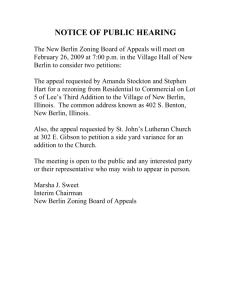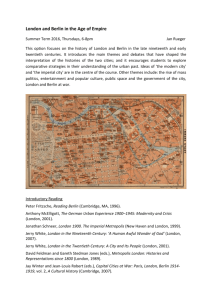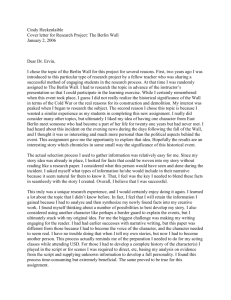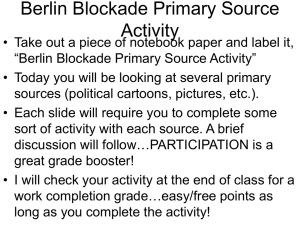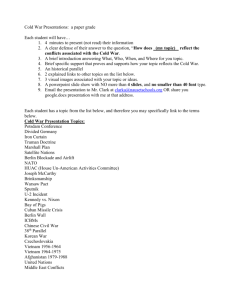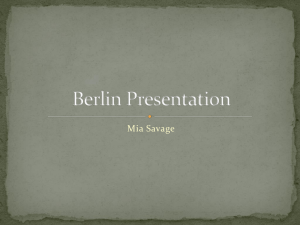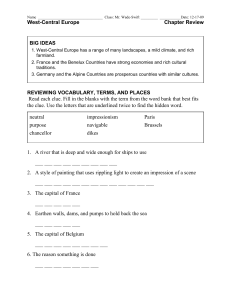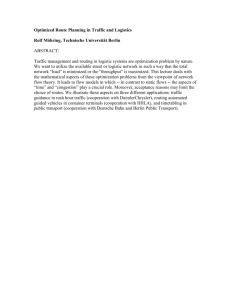Twentieth Century International Disputes and Crises: The Cold War
advertisement
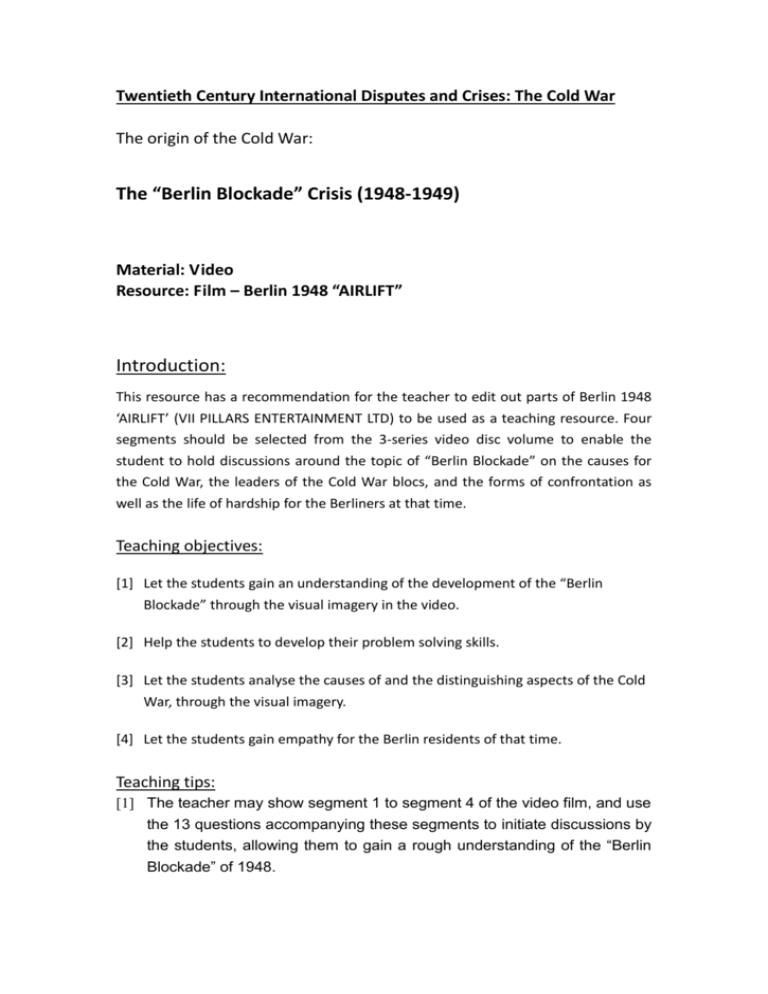
Twentieth Century International Disputes and Crises: The Cold War The origin of the Cold War: The “Berlin Blockade” Crisis (1948-1949) Material: Video Resource: Film – Berlin 1948 “AIRLIFT” Introduction: This resource has a recommendation for the teacher to edit out parts of Berlin 1948 ‘AIRLIFT’ (VII PILLARS ENTERTAINMENT LTD) to be used as a teaching resource. Four segments should be selected from the 3-series video disc volume to enable the student to hold discussions around the topic of “Berlin Blockade” on the causes for the Cold War, the leaders of the Cold War blocs, and the forms of confrontation as well as the life of hardship for the Berliners at that time. Teaching objectives: [1] Let the students gain an understanding of the development of the “Berlin Blockade” through the visual imagery in the video. [2] Help the students to develop their problem solving skills. [3] Let the students analyse the causes of and the distinguishing aspects of the Cold War, through the visual imagery. [4] Let the students gain empathy for the Berlin residents of that time. Teaching tips: [1] The teacher may show segment 1 to segment 4 of the video film, and use the 13 questions accompanying these segments to initiate discussions by the students, allowing them to gain a rough understanding of the “Berlin Blockade” of 1948. [2] Depending on the students’ study progress, the teacher may direct them to explore and deliberate on the causes for the Cold War and the leaders of the Cold War blocs and the forms of confrontation by group discussions. Segment I [Disc 1][ 16:24] The Russians see no need to give justifications when they withdrew from the allied conference -[17:56] then selling Coke Cola. 1. In the film, what did the American leaders think was the reason for Russia to withdraw from the allied conference? Recommended answer: They do not need to give justifications. 2. Who was the Russian leader in the film? Recommended answer: Joseph Stalin. 3. What country did this Russian leader think the Americans would suddenly merge the three occupation zones into? Recommended answer: To form the new West Germany. 4. Did Stalin like this change? Try to look into the resource information for an explanation. Recommended answer: He didn’t like this change. The reason can be any one of the following: a. He sneered aloud; b. He described US foreign policies as grabbing land, then selling Coke Cola. c. We decided in Potsdam to split up Germany, dividing it into four zones. Segment II [Disc 1][21:10] (Washington D.C. White House) who does he think he is? …[23:10] Berliner asking, will there be a miracle? 5. Who was the American president at that time? Recommended answer: Harry Truman 6. How many people would receive food supplied by the Air Force? Recommended answer: Two and half million people. What was food embargo exploited for? Recommended answer: It was exploited as a political weapon. Segment III [Disc 2][13:14] America is making preparations in Berlin… 15:28 this city will slowly fall into enemy hands 8. Please describe the life of hardship for the Berliners at that time. Recommended answer: Children were suffering from the pain of hunger. The hospitals in the city were crowded with people. There was an acute shortage of Penicillin. Pneumonia was widespread. The trees in the parks were cut down to light fire for heating. Frequent disturbances in East Berlin. Fear of a civil war. Municipal government buildings were looted. Segment IV [Disc 3][32:30] (large amount of foods were airdropped) can you guess what they called our airplanes? …33:43 Chocolate tastes good anytime, anywhere. 9. At dawn, what was dropped from the sky? Recommended answer: Large amounts of food were airdropped for the local people. 10. What were the looks in the faces of the local people, try to describe it. Recommended answer: They were very joyful and full of expectations. Group discussion 11. Which two countries were leaders for the two blocs shown in the film segments? Recommended answer: USA, USSR (Russia). 12. By referring to the resources here, what do you think were the causes for the Cold War? Recommended answer: Any one of the following: a. Ideological conflicts (Truman’s US foreign policy is …hoping for all the people in the world to enjoy peace and freedom. They were frantically grabbing land, and then selling their Coke Cola in those places.) b. Strategic standoff (If the Western powers breached the treaty, we will take Berlin as retaliation) c. Mutual mistrust (America was combining its occupation zone with that of the British and the French occupations zones into the newly founded West Germany in a standoff with the Soviet Union, this game was not initiated by us) 13. Try to make an analysis from the resource materials about the forms of confrontation during the Cold War. Recommended answer: Any one of the following: a. Enticing allies, as for example, America was combining its occupation zone with b. that of the British and the French occupations zones into the newly founded West Germany in a standoff with the Soviet Union. Intimidating the other side, for example, the Berlin Blockade. c. d. War of words. Propaganda attacks on the other side.
